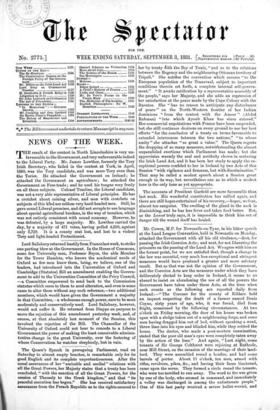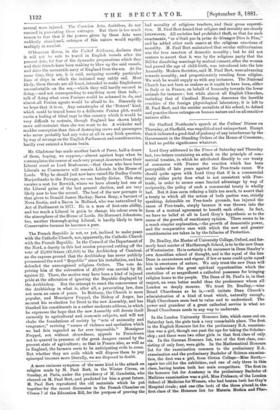Mr. Cowen, M.P. for Newcastle-on-Tyne, in his bitter speech at
the Land League Convention, held in Newcastle on Monday, attacked the Government with all his old virulence,—first, for passin4 the Irish Coercion Acts ; and next, for not liberating the prisoners on the passing of the Land Act. We agree with him oa the former point, for we are satisfied that, though a change in the law was essential, very much less exceptional and stringent measures would have produced a greater and more salutary result. But as that was not the opinion of the Government, and the Coercion Acts are the measures under which they have deliberately elected to keep order in Ireland, it seems to us absurd to insist on abandoning the use of all the powers the Government have taken under these Acts, at the time when such events as the following are reported daily from Ireland :—" The Coroner for the county of Kildare held an inquest respecting the death of a farmer named Denis Coyne, sixty years of age, who, it was found, died from fright, occasioned by the following circumstances. At two o'clock on Friday morning, the door of his house was broken open with a sledge taken out of a neighbouring forge, and some men having dragged him out of bed, without speaking a word, threw lime into his eyes and blinded him, while they robbed the house. The doctor, who made a post-mortem examination, stated that the poor old man's eyes were completely eaten away by the action of the lime." And again, "Last night, some tenants of Sir George Colthurst were rejoicing at Rathcole, near Mill Street, on the occasion of the marriage of their land- lord. They were assembled round a bonfire, and had some barrels of porter. About 11 o'clock, ten men, armed with rifles, revolvers, pikes, &c., and having their faces blackened, came upon the scene. They formed a circle round the tenants, who were too terrified to run away. The word to fire was given by one of the body, who seemed in command, and immediately a volley was discharged in among the unfortunate people." One of this last party received a severe bullet-wound, and
several were injured. The Coercion Acts, doubtless, do not succeed in preventing these outrages. But there is too much reason to fear that if the powers given by those Acts were suddenly abandoned, outrages of this nature would rapidly multiply in number.



































